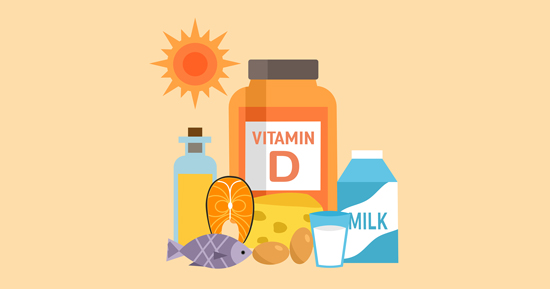
Vitamin D is a fat-soluble vitamin essential for health. It keeps your bones strong, can improve your mental health and helps you sleep.
According to the National Institutes of Health, almost 1 in 4 U.S. adults are considered low in vitamin D. Symptoms depend on how severe the deficiency is and the person.
Vitamin D deficiency has become more common over the past several years. The University Health Center occasionally screens for this condition in patients struggling with fatigue, depressive symptoms and bone issues.
Health center provider Sarah Wallingford, PA, shares what vitamin D deficiency looks like – and three ways to overcome it.
Symptoms when vitamin D is low
Most people with vitamin D deficiency are asymptomatic. However, if you're exhausted, your bones hurt, you have muscle weakness or mood changes, that's an indication that something may be abnormal with your body.
Symptoms of vitamin D deficiency may include:
- Fatigue
- Not sleeping well
- Bone pain or achiness
- Depression or feelings of sadness
- Hair loss
- Muscle weakness
- Loss of appetite
- Getting sick more easily
- Pale skin
If these symptoms sound familiar, it’s time to see a medical professional. They may do a blood test to check your vitamin D levels to see if they are within normal range.
Get vitamin D from food
5 foods naturally high in vitamin D:
- Fatty fish like salmon, trout, tuna and mackerel
- Canned fish like herring and sardines
- Egg yolks
- Beef liver
- Fish liver
5 vitamin D fortified foods:
- Breakfast cereals
- Milk
- Almond milk
- Soy milk
- Orange juice
Since there aren't a lot of naturally occurring vitamin D foods, many products are enriched with vitamin D. Always check the nutrition label to ensure there's vitamin D added.
Get vitamin D from sunlight
When your skin is exposed to ultraviolet rays from the sun, your body creates vitamin D.
Make time daily to get out in the sun. If you don’t have classes, work or commitments scheduled that require you to go outside for the day, set aside a few minutes to take a quick walk, even if it’s just around your residence hall or the block. Remember to wear sunscreen, even on cloudy, gloomy days.
If you don’t get regular sunlight, you may need to increase your dietary intake or take a vitamin D supplement.
Take a vitamin D supplement
Most people should be taking a vitamin D supplement, Wallingford says.
Vitamin D has two main forms: D2 and D3. You can absorb both types in your body. Still, studies have shown that vitamin D3 raises your levels more effectively than vitamin D2. For this reason, Wallingford recommends over-the-counter supplements that contain vitamin D3 or taking a cod liver oil supplement. Vitamin D3 supplements can be purchased at the University Health Center pharmacy.
The recommended dietary allowance of vitamin D for young adults is 600 international units. A doctor may prescribe a prescription-strength dose of vitamin D if your levels are severely low.
Are vitamin D supplements safe?
Yes. A vitamin D supplement doesn't cause many adverse effects at recommended doses. What you don't use, your body usually urinates out, so it's difficult to overdose on vitamin D unless you are taking massive doses.
Extremely high vitamin D levels are harmful and can cause nausea, vomiting, confusion, excessive thirst and kidney stones. Vitamin D supplements can interact with certain medications, so check with your doctor before starting one.
Who is more at risk for vitamin D deficiency?
People with darker skin are much better protected from UV rays but also need to spend more time in the sun than people with lighter skin to produce the same amount of vitamin D. Non-Hispanic Black people generally have higher rates of vitamin D deficiency. The darker your skin, the less vitamin D you make from sunlight exposure. People who are obese, those with osteoporosis, and people with malabsorption disorders like celiac disease or inflammatory bowel disease are also at risk for vitamin D deficiency.
If you are concerned you have low vitamin D levels and would like to talk to a doctor about it, schedule an appointment at the University Health Center by calling 402.472.5000.